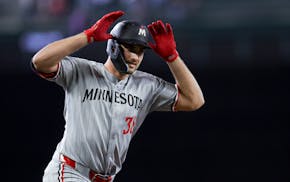MINNESOTA UNITED | ANALYSIS
The formula for winning on the road in soccer is pretty standard, across the globe. First, be defensively sound; then, look to score on the counterattack, since most teams will try to control the ball at home. And of course, get a goal on a set piece, if you can.
It's a plan that Minnesota United used to great effect this season. The Loons won eight road games and picked up 27 points away from home, both tied for the best in the Western Conference, and if you look back at those eight wins, a pattern emerges. Charlotte? Kept a clean sheet, scored on the counter, scored from a set piece. Atlanta? Allowed just one goal, scored on the counter, scored from a set piece.
Now, the Loons are faced with a winner-take-all playoff game on Nov. 24 against the LA Galaxy — on the road. So how can they come out of Dignity Health Sports Park with a win?
Well, it's simple: be defensively sound, score on the counter and maybe get a goal off a set piece.
In this case, though, it's not just because of the obvious "how to win on the road" cliché. The tried-and-true road formula also happens to play into the Galaxy's weaknesses. They're among the worst teams in the league at transition defense, and they have struggled all season to defend set pieces.
Look back on the three goals Minnesota scored against the Galaxy this season, and you won't be surprised: two goals from set pieces, plus an absurd transition goal from Teemu Pukki in which every defender seemed absolutely determined to stay at least 10 yards away, no matter how close Pukki got to the penalty area.
It was widely observed this year that the Galaxy, with all of their attacking stars, were potential contenders for the MLS Cup. Most observers agreed that all that they really needed was an All-Star center back in the summer transfer window, and they might be the favorites.
Their summer transfer move? Signing German legend Marco Reus, who for all his excellent qualities, is a forward, not a center back.
The Los Angeles teams are constantly tempted by an endless supply of aging European superstars who are ready to try out the Hollywood life, all in exchange for a little money and the promise of some sunshine. Reus is part of a long, illustrious line of overseas arrivals; it's not surprising that the Galaxy were unable to resist.
It does, however, mean that the Galaxy's defensive game plan is along the lines of "wait until the other team scores, then get the ball out of the net and try to score twice more." Los Angeles won seven games this season in which the opposition scored two or more goals, tied for second most in the history of the league.
The Galaxy are the rare team that can outscore its mistakes, and that's where part one of the Loons' plan comes into play; Minnesota believes that it can be defensively sound against Los Angeles. "I think we've typically done well against teams that have a number of high-profile individuals that a lot of play spins around," coach Eric Ramsay said. "I think we can be really effective in preventing teams like that from finding the rhythm that they typically would."
The first half of the Loons' first game against the Galaxy this season still stands as one of the team's best halves of the season, as Minnesota held the Galaxy without a shot attempt or a corner kick.
Watching it back, you can see one of the biggest defensive keys: a forward line that is constantly defending Riqui Puig in midfield, and staying close to the defense and reducing the space in between the defensive lines.
That day, the Loons played three forwards — Tani Oluwaseyi, Sang Bin Jeong, and Bongokuhle Hlongwane — who were particularly well suited for that role. All are quick, all are energetic and all are max-effort type of players. Now, Minnesota has settled into a different front three — Kelvin Yeboah, Robin Lod and Joaquín Pereyra — and so the biggest defensive key might be whether the new front three can replicate the energy and effort of that original front three.
It's worth noting that in that game, all three forwards were substituted in the 60th minute — and the Galaxy scored twice in the next 10 minutes.
Minnesota is unlikely to win a shootout; the Loons were 1-11-2 this year when the opposition scored two goals or more. For all the Galaxy's defensive issues, Minnesota probably can't simply outscore Los Angeles.
Lucky for the Loons, who have given up only two goals over the past seven games, defense has become the team's identity. "I feel like if we're a good version of ourselves, we'll be a really good matchup for them," Ramsay said. "It'll be about trying to get us back to a version of ourselves that is starting to look like it can be a match for absolutely anyone."
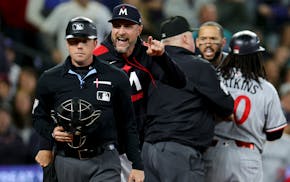
Twins' Correa ejected from on-deck circle, and he's not really sure why
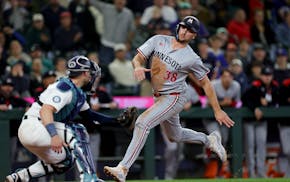
Twins' inability to score in extra innings costly in wild loss at Seattle
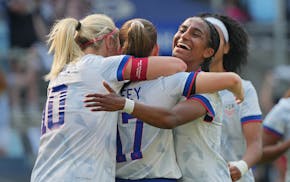
USWNT shuts out China 3-0 at Allianz Field
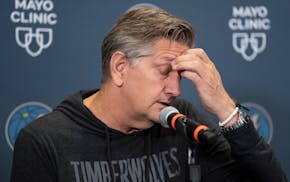
Analysis: The Wolves' offseason, broken down for easy consumption of a complicated topic
